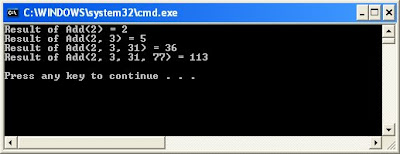Picked this one up from
The C++ blog.
Consider the following program:
#include <iostream>
int main()
{
int i;
int array[4];
for(i=0; i<=8; i++)
{
array[i]=0;
}
return 0;
}
Most people including myself expect this program to crash. This is not the case. The reason being the way everything is stored on stack. In simple representation, the storage is something like this:
So when i = 6, value of i is reset to 0 and the loop continues forever.
After digging some information on stack, heap, etc. I found some useful info in
C++ in 24 hours:
Programmers generally deal with five areas of memory:
- Global name space
- The free store (a.k.a. Heap)
- Registers
- Code space
- The stack
Local variables are on the stack, along with function parameters. Code is in code space, of course, and global variables are in global name space. The registers are used for internal housekeeping functions, such as keeping track of the top of the stack and the instruction pointer. Just about all remaining memory is given over to the free store, which is sometimes referred to as the heap.
The problem with local variables is that they don't persist. When the function returns, the local variables are thrown away. Global variables solve that problem at the cost of unrestricted access throughout the program, which leads to the creation of code that is difficult to understand and maintain. Putting data in the free store solves both of these problems.
You can think of the free store as a massive section of memory in which thousands of sequentially numbered cubbyholes lie waiting for your data. You can't label these cubbyholes, though, as you can with the stack. You must ask for the address of the cubbyhole that you reserve and then stash that address away in a pointer.
The stack is cleaned automatically when a function returns. All the local variables go out of scope, and they are removed from the stack. The free store is not cleaned until your program ends, and it is your responsibility to free any memory that you've reserved when you are done with it.
The advantage to the free store is that the memory you reserve remains available until you explicitly free it. If you reserve memory on the free store while in a function, the memory is still available when the function returns.
The advantage of accessing memory in this way, rather than using global variables, is that only functions with access to the pointer have access to the data. This provides a tightly controlled interface to that data, and it eliminates the problem of one function changing that data in unexpected and unanticipated ways.
For this to work, you must be able to create a pointer to an area on the free store and to pass that pointer among functions. The pointer is created using new and once you are done with it you can free the memory using delete.




















